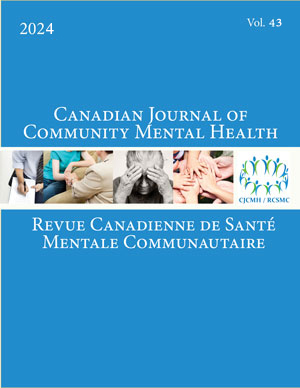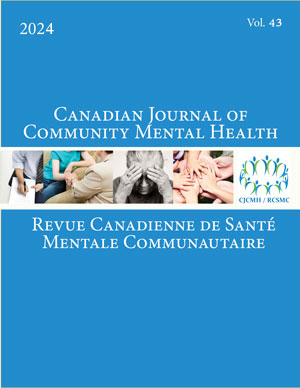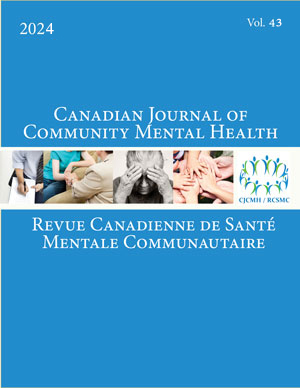Volume 14 • Number 2 • September 1995
OPEN ACCESS
OPEN ACCESS
This paper provides an exploratory analysis of the relationship between participation in self-help groups and other informal and formal strategies by which individuals cope with stressful life events during later life. A principal research question is the extent to which older adults substitute or supplement self-help group assistance with professional care, self-care, spiritual coping, informal support, and mutual aid. A sub-sample of individuals (N=5,956) were drawn from the 1991 Survey of Ageing and Independence who had been asked about a variety of coping strategies to deal with the stress associated with one or more major life events. Preliminary analyses of the intercorrelations among these health behaviours indicated that all of the methods for coping with stressful life events are positively, but relatively weakly, correlated with one another. A logistic regression of self-help group involvement was also conducted, in which the other health behaviours, and several demographic and social background factors identified in the literature, were used as predictor variables. The most striking finding was that people who used professional assistance of any kind were three times more likely to participate in self-help groups. Mutual aid, self-care, and spiritual coping were also found to be important predictors of self-help group involvement. The results are discussed in terms of their implications for further research into the relationships or interplay among various health behaviours.
OPEN ACCESS
Cet article vise è démontrer la pertinence et la faisabilité de la perspective futuriste de Frank Riessman qui propose de restructurer en profondeur nos services publics, en transformant les personnes en besoin en personnes aidantes. Certains des programmes les plus connus qui sont fondés sur l'entraide sont d'abord décrits brièvement et ensuite les expérimentations effectuées dans le cadre de projets-démonstration sont présentées de façon plus détaillée. Ces projets-démonstration sont surtout issus du contexte québécois et visent è combler le fossé entre les services professionnels et les communautés locales, en effectuant un arrimage avec les systèmes informels d'entraide. L'entraide sera discutée sous l'angle de deux modalités spécifiques, soient les jumelages entraidants entre clients et les jumelages entre clients et aidants naturels. L'intégration de ces stratégies è la pratique professionnalle est rendue difficite è cause des changements importants qu'elle exige du professionnel, tout autant au niveau de la pratique que du contexte organisationnel dans lequel il oeuvre. Un des bénéfices les plus importants qui découle de la restructuration de l'aide tient au fait de son expansion qui procure des ressources d'aide accrues è la société et aux services publics. C'est en transformant les aidés en aidants que les ressources sont élargies, car le fait d'avoir le problème devient une composante de la solution. Au lieu de penser è 10 millions d'alcooliques qui ont besoin d'aide, le nouveau paradigme les conçoit comme des aidants, ce qui a comme effet d'accroitre les ressources d'aide non seulement quantitativement mais aussi qualitativement. La qualité accrue de l'aide découle du type de compréhension unique que possèdent ces personnes qui représentent des modèles très crédibles è cause de leur expérience (Riessman, 1990, p. 225).
OPEN ACCESS
Using qualitative methods, we studied current and desired relationships between members of mental health consumer/survivor and family self-help groups and mental health professionals. Two major themes, professional ideology and practices and power and control, captured both the positive and negative aspects of the relationships the participants had experienced. To move toward more desired relationships, participant suggested education and ongoing interaction between self-helpers and professionals are needed to change professional ideology and practices, while consumer/survivor and family participation and involvement in decision making are required to reduce the power imbalance between self-helpers and professionals. We discuss the implications of the findings for changes in training, practice, and research.
OPEN ACCESS
L'expérience de l'auteure, en tant que professionnelle dans un groupe de soutien pour parents, est présentée è partir d'extraits de son journal de bord. Ces extraits, construits autour d'une anecdote, sont suivis d'une analyse permettant d'approfondir la réflexion. Le difficile apprentissage du partenariat entre la professionnelle et les membres du groupe de soutien ainsi que l'importance de la «connaissance d'expérience» sont soulignés.
OPEN ACCESS
This paper explores the way in which 10 of the leading professionals working in the area of mutual aid came to develop their deeply rooted appreciation for the contributions to well-being that are made by self-help groups. The purpose was to find out if these experiences might suggest ways to help future professionals to develop such a self-help perspective. This series of conversations revealed that this group of practitioners had a variety of early life experiences that made it difficult to accept some of the mainstream beliefs and values of their various professions. Instead they had gradually become more convinced of the capacity of lay people to exchange mutual aid in reference to their shared concerns. This may suggest the need to support collaborative problem solving much earlier in the educational journey that precedes professional training and the need to select students for the helping professions who already demonstrate that they value mutual aid.
OPEN ACCESS
The Mood Disorders Association of Metropolitan Toronto is dedicated to self-help and mutual aid for people with depression and manic-depression, their families and friends. In 1993, the Association received a grant from the Trillium Foundation to develop a training program and companion handbook for its volunteer support-group facilitators. We began by jointly affirming our self-help mission and mandate. The board of directors, group facilitators, and staff met for a one-day organizational visioning day where we developed a clear mission statement: “We help by sharing. You are not alone. We offer hope and encouragement to one another. We empower one another through sharing resources and information.” The training project was our first opportunity to bring these values to life. Thus, instead of teaching the facilitators group-work skills, as the word “training” suggests, we captured their experiential knowledge and combined it with a valued hallmark of self-help; personal stories. The resulting handbook, entitled You Are Not Alone, is a practical users' guide to the mental health system, informing readers about what to look for and what to look out for in mental health care. However, the publication of the handbook sparked intense controversy within the organization's board of directors and challenged the organization's commitment to its self-help mission and mandate. In the end, the Association weathered the challenge and through an intense and painful process, deepened its commitment to living the values of self-help.
OPEN ACCESS
Je considère que j'ai un droit de parole privilégié sur l'entraide dans les groupes d'entraide en santé mentale parce que je suis titulaire d'un équivalent de «diplôme universitaire» du centre hospitalier de Valleyfield, département psychiatrique où je fus psychiatrisé. C'est aussi parce que c'est l'entraide qui m'a sorti de la torpeur et de la résignation où j'étais plongé depuis mon séjour en psychiatrie. Il faut aussi savoir que je suis fatigué de me faire dire comment faire et quoi dire sur le vécu psychiatrique par des personnes qui n'y sont jamais allées. Certaines réflexions du Regroupement des Ressources Alternatives en Santé Mentale du Québec (RRASMQ) sur les groupes d'entraide seront aussi présentées.
OPEN ACCESS
In May of 1987, Health and Welfare Canada awarded the Self-Help Clearinghouse of Metropolitan Toronto a three-year demonstration grant. Today, the Toronto Clearinghouse remains the only free-standing self-help resource of its kind in Canada and is a registered charitable organization whose mandate is to facilitate the growth and development of self-help/mutual-aid groups, networks, and resources. This paper describes the unique Toronto Clearinghouse model which from its carliest beginnings has been a partnership between the self-help community and interested and supportive professionals. The success of this model stems from its strong grassroots origins, respect for a community empowerment approach, and focused goals and objectives. Using information gleaned from the archival history of the Toronto Clearinghouse and through a series of interviews with past and current members of the Clearinghouse board of directors, program staff, and local self-help group members, the paper explains the “roller coaster ride” which has characterized the history of the Clearinghouse to date. Finally, the paper illustrates that while the achievement of financial stability has been an ongoing challenge in the face of variable community and political support, the Toronto Clearinghouse is, today, a strong centre of self-help activitity and promotion, involved in a unique exercise to determine the role that self-help can play as a strategic component of an overall health and social services system—and with every reason to be optimistic about its future.
OPEN ACCESS
This paper reports on recent developments in the self-help movement in Canada based on the findings of a country-wide survey of self-help clearinghouses and interviews with key informants. Among the outcomes of this survey are an estimate of the number of self-help groups in various communities in Canada as well as a presentation of current trends in the growth of these entities. The author also explores recent fiscal and policy trends in the Canadian context and discusses their impact on the development of self-help groups and clearinghouses in the country.
OPEN ACCESS
“Healthy Alternatives/Healthy Choices”: Considering the Usefulness of a Support Group for Caregivers
The popularity of support groups to reduce the hurden of caring for a frail elderly relative is growing, with many service providers offering these groups for family caregivers. Evaluations of support groups find mixed evidence for their efficacy in reducing caregiver burden. Our process evaluation of the model program for Ontario's Placement Coordination Services (PCS) indicates this program meets short-term emotional and informational needs for care-givers. It is unlikely, however, to result in immediate or lasting behavioural changes. Results are discussed in relation to six components of the service delivery process from program planning through follow-up.
OPEN ACCESS
Cet article décrit les grandes lignes du programme «Vie de famille, de la discipline è l'amour» et présente les principaux résultats d'une évaluation de ses effets. Ce programme est une intervention de groupe, structurée, composée de six ateliers. Son but général est de soutenir les parents d'enfants fréquentant l'école primaire dans leur rôle d'éducateur en tenant compte de leur réalité familiale respective. L'évaluation des effets a été réalisée è l'aide d'un devis prétest/posttest auprès d'un groupe expérimental composé de 115 participants, répartis en neuf sous-groupes, et d'un groupe témoin comptant 67 parents. Globalement, les résultats obtenus permettent de croire que le programme peut être efficace, tout au moins sur certains plans et è court terme. En effet, comparés aux parents du groupe témoin, les participants aux ateliers évaluent avoir moins de difficultés è accomplir leur rôle d'éducateur, ce qui indique que le programme semble rencontrer son but génèral. Ils se perçoivent aussi comme étant plus efficaces comme parents. Des entrevues réalisées aprés l'intervention viennent appuyer ces résultats.
OPEN ACCESS
University marks an important transition in many people's lives, from adolescence to young adulthood. University students often move away from home, establish new friendships, and attempt to cope with academic work that may be much more demanding than that which they have previously experienced. Many have difficulty in making this transition, as evidenced by the fact that a high proportion (up to 40%) of students who enter university fail to complete their degrees. The present study assessed the impact of a support group intervention for students entering their first year of university. Students attended six weekly 90-minute sessions led by male and female facilitators. The sessions focused on issues such as forming new social ties, residential concerns, and how to balance academic and social demands. Social support and transition adjustment measures were administered to three nine-member intervention groups (N=27), and to randomly assigned comparison participants (N=28). For two of the three intervention groups, results indicated that those involved in the discussions experienced better adjustment to university and more gains in social support than did those in the non-intervention group. A third group was omitted from the analyses because delivery of the intervention was compromised for various reasons. Results are discussed with an emphasis on factors influencing the intervention's effectiveness.
OPEN ACCESS
Dans cet article, nous rapportons une évaluation du processus d'une expérience de groupe avec des parents négligents. Les parents négligents éprouvent évidemment des difficultés è assumer leurs responsabilités parentales, mais ils présentent aussi comme caractéristique de vivre des situations difficiles, de souffrir d'isolement, et d'être peu intégrés dans leur communautés. Une expérience de groupe a été réalisée auprès de 35 familles, dont 33 femmes et 17 hommes, retenues comme négligentes par le CPEJ. Les parents ont été répartis en quatre groupes chacun animé par un professionnel. Nous tentons ici de dégager ce que l'expérience de groupe comporte et peut apporter compte tenu des besoins spécifiques de ces parents.
OPEN ACCESS
In September 1994, the Addiction Research Foundation of Ontario hosted an international conference on addiction and mutual-help movements. The conference was attended by researchers from 13 countries and several clinicians, theorists, and self-identified members of Alcoholics Anonymous who were also full participants or observers. These notes highlight selected topics and include a short bibliography of publications from a recently completed international collaborative study of Alcoholics Anonymous.
OPEN ACCESS
A review of medical, social science, and “grassroots” literature on support groups and breast cancer, this paper concerns the need among women living with breast cancer and their caregivers for more information on the efficacy of social support as a therapeutic intervention. The literature has been subdivided into reviews of articles dealing with professionally led support groups, community-based support groups, support groups and survival, and support groups and psychological adjustment.
OPEN ACCESS
Signs of progress in the study of mutual aid and social support include a greater emphasis on the collection of empirical data to evaluate program effects and to comprehend relations between professional and informal sources of aid, as well as a clearer delineation of concepts and creative integration of practices associated with mutual aid. Several directions for future research on support interventions are addressed, including the nature and timing of outcome measures, analyses of the optimal fit of participants to different intervention formats, and the need for research designs that yield information about the necessary and cost-effective components of support interventions.










